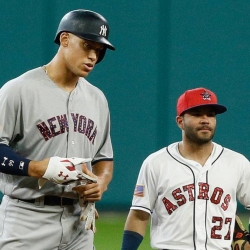Major League Baseball (MLB) Commissioner Rob Manfred continues to support an integrity fee for federally-legal sports bets. The MLB Commissioner believes integrity fees should be paid by sportsbooks to sports leagues for the costs of maintaining the integrity of the game.
Even before the United States Supreme Court struck down the PASPA federal ban and legalized sports betting at the federal level on May 14, Rob Manfred spoke about the need for US sports leagues to collect fees from the gaming operators who accept sports bets.
In a recent radio interview with WFAN New York sports radio, Rob Manfred reiterated his point.
Admitting that sports betting is “here to stay”, the baseball commissioner said, “We have to expend time, effort, resources to make sure that the increased legalized gambling doesn’t become a threat to the integrity of our game.”
Sports Betting: “Source of Fan Engagement”
Manfred added, “We also recognize that gambling can be a source of fan engagement. We want our fans engaged with our sport in every possible way and we will take advantage of this new landscape to try to make people even more interested in Major League Baseball.”
Thus begins the debate on whether sports leagues should receive fees from sportsbooks for using their product to make money. The two sides of the debate each have their pat answers. They also have their passions.
Sports Leagues vs. Sportsbooks
In October 2014, MLB joined with the NBA, NFL, NHL, and NCAA to sue the state of New Jersey, Monmouth Park Racetrack in Oceanport, and William Hill USA to stop the latter two entities from opening a sportsbook. Two years prior, the same five sports associations sued New Jersey to stop similar sports betting.
In all, the US sports associations engaged in a protracted 6-year legal battle to enforce the PASPA federal ban on sports betting in 46 states. Politicians and gaming executives in New Jersey have no interest in paying fees to the same sports leagues who tried to keep them from opening sportsbooks in the first place.
Monmouth Park filed a $150 million lawsuit against the sports leagues, claiming the leagues cost the racetrack that much money with their lawsuits. Former New Jersey State Senator Ray Lesniak said he would fight to keep from paying the leagues “one dime of tribute“.
MLB’s Argument for Integrity Fees
For their part, the leagues say they spend vast amounts of cash to pay players and organize games, so they should be paid for the sportsbooks’ use of their intellectual property. In Rob Manfred’s opinion, sportsbooks using game information to make cash is like someone who pirates Hollywood films or tv shows for profit.
Rob Manfred told WFAN, “The fact of the matter is, the sports leagues spend literally billions of dollars to stage these games. I do not think it’s unreasonable to suggest that people who are free riding on our product…should have to compensate us.”
How Much Does Integrity Monitoring Cost?
MLB, which has had the most-publicized match-fixing scandals in American sports history (Black Sox Scandal, Pete Rose), fears the consequences of rampant sports betting in dozens of US states. Manfred added, “The deepest fear is that somehow people involved in betting try to influence the outcome of the game on the field. That’s the deepest fear.”
“Integrity monitoring is a really expensive undertaking. It’s very sophisticated. It involves the analysis of massive amounts of data in order to detect patterns in the betting that can be of concern.”
Manfred argued that uniform federal regulations are needed to monitor the massive sports betting activity. While the Supreme Court struck down PASPA, it said that the US government could pass new sports betting legislation — as long as it is uniform. For instance, the US Congress could ban sports betting in 50 states or it could pass regulations for all 50 states, as long as the new federal law did not favor one state over another as the PASPA did.
State Laws Are Not Enough
That is what Rob Manfred continues to argue is needed. In Manfred’s estimation, a patchwork of jurisdictions would create a second-rate regulatory framework for American sports betting. He told the New York City radio hosts, “I do not believe that it is appropriate for Major League Baseball…to rely on a bunch of state regulators to ensure the integrity of our sport.”
“Quite frankly, I don’t believe they’ll be as good at it as we will be.”
But according to Rob Manfred, that will take more resources and more cash than it would have when only 4 states had sports betting (and three of those only had sports lotteries). His opponents would say that Major League Baseball fought for years to eliminate sports betting, but stands to make countless millions from the increased ratings sports betting will bring TV baseball games.

